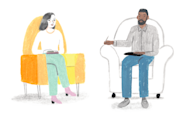In just one moment, my life changed forever. I’ll never forget the phone call. I screamed and cried so loud the neighbors knocked on my door and asked if I was okay. I wasn’t.
“Belinda… Kelly… Kelly is in the hospital for attempting to take her life,” my dad sobbed through the phone.
As soon as we heard this news, my sister Lisa and I flew from Los Angeles to Cincinnati, Ohio, where my mom, dad and our other sister Kelly lived. We spent as many hours as permitted at the University of Cincinnati Neuroscience ICU at Kelly’s bedside. She was in a coma.
We talked to her. We bawled. We held her hand. We kissed her. We told her we loved her. A few days later, on August 23, 2020, she passed away.
***
I remember when my mom brought baby Kelly home from the hospital. I remember holding her in my arms, singing to her when she’d cry. I’d known Kelly since the day she was born. It was virtually impossible to comprehend that someone whose life was so intertwined with mine was now no longer there.
It was nothing short of earth-shattering.
Research suggests sibling loss is one of the most disruptive and severe forms of grief. This is because sibling relationships are the longest and most intimate relationships of a person’s lifetime.

Attention is usually focused on the parents or their surviving spouse and children. This is true in our case; our parents have received more support from their community around the loss of their daughter than Lisa and I did around the loss of our sister.
I’ve also been told many times to be “strong for my parents.”
According to the group Sibling Survivors of Suicide Loss, around 25,000 people become sibling survivors of suicide each year.
While there are support groups for parents who have lost children, or people who have lost partners, it’s hard to find a community intended specifically for siblings. This makes it incredibly lonely and isolating to have lost a sibling. It’s hard to explain the particular grief we feel to people; it seems somehow “less” than the grief of my parents.
I’ve also been told many times to be “strong for my parents.”
Despite sibling loss being largely overlooked in our society, I have found ways to work through the devastation. With the support of family, friends, professionals, and those who have also lost siblings or someone to suicide, I have embarked on a journey towards healing, one day at a time.
Learning to forgive myself
There’s a natural instinct to feel protective over a sibling, especially a younger sibling, so it’s easy to feel guilty when one passes away. This is especially true with suicide.
Lisa and I constantly struggle with survivor’s guilt: We should have prevented this. What did we do wrong? How could we have outlived our 23-year-old sister?
Kelly did not speak about her mental illness often, but I still wish I’d been there for her more. One of the first things my therapist told me was that I can’t blame myself for everything I wish I’d done differently. I was busy surviving and coping with my own problems. What happened to Kelly was a result of severe mental illness and an abysmal lack of education around suicide prevention in our society.
Even when I’m drowning with regret, wanting to go back in time, I remind myself that what happened is no one’s fault and we can’t always control what happens in life. Seeking a false sense of control through self-blame doesn’t help. I have to practice self-forgiveness.

Coming together as a family
Lisa and I know that we are incredibly fortunate to have each other to lean on. We try to visit our parents back in Ohio more often than we used to. We don’t take a single moment with them for granted. When we can’t be there, my family now video chats once a week and we have a practice of talking to Kelly as if she’s here with us. This helps us maintain a connection with her.
We also check in with each other to make sure we’re all doing okay. We’ve made a promise: no more silent hardships. If any of us are struggling, we need to make it known so we can help one another. Through doing this, my family has become much closer and more empathetic.
We practice more patience and kindness. My father, who previously did not believe mental illness could be so destructive—a feeling all-too-common in the AAPI community—finally learned, the hardest way possible, how real and devastating it can be. He’s more compassionate because of it.

Honoring my sister in everything I can
Something that has helped is finding ways to honor and celebrate Kelly. When we were together on a day trip in Yellow Springs months ago, we yelled into the sky, “We love you Kelly!” and took a video.
For her birthday on April 1st, we planted a dogwood tree in our front yard with a memorial stone that says, “Kelly JinJin Cai / Always A Cai / Forever Love” on it. The tree will blossom just as our love for Kelly will continue to grow. We also all wrote personalized messages onto balloons and released them into the air.
We purchased a memorial bench for her in one of our favorite parks, one where we’d taken many walks as a family. It has a placard that says “Kelly Cai, daughter and sister. Avid reader and lover of cats.” When people see it, they’ll learn a little about her personality, keeping a little piece of her alive.
I don’t try to distract myself.
I wrote a short album titled “Kelly Forever” and am continuing to write music for her. I write poetry as well. Lisa is making visual art for Kelly. My parents are writing and painting for her. We’ve also donated money to groups like AFSP that help prevent suicide, in Kelly’s honor.
Finding solidarity with others
Losing a sibling to suicide is a uniquely tormenting experience. Those of us who know it are members of a small, sorrowful fraternity. I was lucky to be connected by friends to two women who had also lost their sisters to suicide. They truly get it. I’m still in touch with them and consider them part of my support system.
I’ve spoken with a handful of others who have lost loved ones to suicide or have lost siblings. Hearing these people share their experiences and coping mechanisms has been more valuable than I can quantify. It’s moving to hear them speak about their immense love for their siblings; it reminds me that even though Kelly is gone, my love for her will never fade.
I’m in a support group for survivors of suicide loss (SOSL) on Facebook and follow Instagram accounts about grief. I occasionally attend an SOSL support group via video chat. In the first session, I heard so many heart wrenching stories similar to mine. It was difficult, but the experience of talking with people who I can relate to has made me feel less alone.
Personal rituals and takeaways
Of course, therapy is immensely helpful. My therapist told me to do daily rituals that make me feel connected to Kelly. I’ll often light incense for her and talk to her. I’ve hung up a photo collage of Kelly on my bedroom wall, and look at it and think of her. I go out in nature and try to feel connected with Kelly’s spirit. I carve her initials into trees everywhere I travel, leaving a bit of her behind.
I’m also journaling as much as I can, jotting down things I wish I could tell Kelly, memories I have with her, and what I wish our lives together could be like. There isn’t a day that goes by where I don’t think about how much I miss Kelly’s warm smile, gentle humor, profound kindness, deep generosity, and frequent silliness. I want to write down everything.
I don’t try to distract myself. When the sadness hits, it hits. I let it come. I allow myself to cry whenever I need to, which is often.
I’ve realized, even in this short time, that grief is never something you “move on from” or recover from—you grow with it. You learn to live with it. Grief morphs and takes different forms, and comes in waves. You have to move with it.
Through my grief journey, I now have a renewed gratitude for life and an appreciation of the small things. I want to live in a way that would make Kelly proud. With every step forward I take through the pain, I know Kelly is with me.
What to do if someone you know exhibits warning signs of suicide
If someone you know is dealing with suicidal thoughts, there is help. Here are some important reminders.
Do not leave the person alone
Remove any firearms, alcohol, substances or sharp objects that could be used in a suicide attempt
Text TALK to the Crisis Text Line at 741741 or
Call the National Suicide Prevention Lifeline at 1-800-273-TALK (8255)
Take the person to an emergency room or seek help from a medical or mental health professional
Here are some additional resources:
The American Foundation for Suicide Prevention has over 50 local chapters across the country with local support for those considering suicide and their loved ones.
The Suicide Awareness Voices of Education (SAVE) foundation provides resources for those who have survived a loss by suicide.





